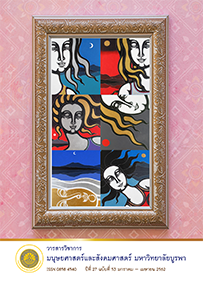Children’s Oppression in Roald Dahl’s Children’s Literature
Main Article Content
Abstract
The objectives of the study were to, 1) explore children’s oppression depicted in Roald Dahl’s children’s stories, and 2) discuss the meanings of children’s oppression intermingled in Roald Dahl’s children’s stories. The qualitative research approach was employed for the investigation and the results were presented in descriptive form. The examination unveiled that children’s oppression was prevalently depicted in ten Dahlian stories for the children: James and the Giant Peach (1961), Charlie and the Chocolate Factory (1964), The Magic Finger (1966), The Enormous Crocodile (1978), The Twits (1980), George’s Marvelous Medicine (1981), The BFG (1982), The Witches (1983), Matilda (1988), and The Minpins (1991). A multitude scenes of children’s oppression in these Dahlian works were inspired by the author’s personal life. In the meantime, Dahl’s works for the children demonstrated the author’s attempt to reflect the social issues to the readers.
Downloads
Article Details
บทความทุกบทความเป็นลิขสิทธิ์ของวารสารวิชาการมนุษยศาสตร์และสังคมศาสตร์ มหาวิทยาลัยบูรพาเท่านั้น
References
Anderson, T. H. (2007). The Sixties. New York: Pearson Longman.
Ariès, P. (1962). Centuries of Childhood: A Social History of Family Life. Trans. Robert Baldic. New York: Vintage.
Boswell, G.R. (1996). The Prevalence of Abuse and Loss in the Lives of Section 53 Offenders: Young and Dangerous–the Background and Careers of Section 53 Offenders. London: The Princes Trust.
Brooks-Gunn, J., & Duncan. (1997). The Effects of Poverty on Children. The future of children, 7(2), 55-71.
Buss, A. (1971). Aggression Pays. In J. L. Singer (ed.), The Control of Aggression and Violence: Cognitive and Psychological Factors. (pp. 7-18). New York: Academic Press.
Dahl, R. (2001). Boy: Tales of Childhood. London: Penguin Group.
Gubar, M. (2009). Artful Dodgers: Reconceiving the Golden Age of Children’s Literature. Oxford: Oxford University Press.
Jay, T. (2009). Do Offensive Words Harm People? Psychology, Public policy, and Law, 15(2), 371-407.
Hunt, A. (1999). When Did the Sixties Happen? Searching for New Directions. Journal of social history, 33(1), 147-161.
Mause, L.D. (1974). The History of Childhood. New York: Psycho-history Press.
Minneboo, N. (2012). A Modern Fairy Tale: Gender and Power in Roald Dahl. MA Thesis, English Language and Culture, University of Amsterdam.
Myers, J.E.B. (2008). A Short History of Child Protection in America. Family law quarterly, 42,(3), 449-463.
Shaw, T. (2007). Historical Abuse System Review: Residential Schools and Children’s Home in Scotland 1950 to 1995. Edinburgh: Crown Copyright.
Sturrock, D. (2010). Storyteller: The Authorized Biography of Roald Dahl. New York: Simon and Schuster.
Sullaway, M. (2004). Psychological Perspectives on Hate Crime Laws. Psychology, public policy, and law, 10(3), 250-292.
The Holocaust: a history summary. (1997). Washington, D.C.: U.S. Holocaust Memorial Museum.
Young, I. (2004). Five Faces of Oppression. In Oppression, Privilege, & Resistance (pp. 37-60). Boston: McGraw Hill.


